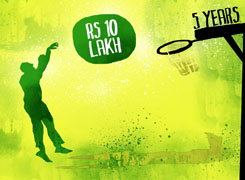How can a 42-year-old with a wife and 9-year-old son invest 40 lakhs for long-term returns?
Vivek Lala |323 Answers |Ask -Follow
Tax, MF Expert - Answered on Sep 30, 2024
Lala cleared his chartered accountancy exam in 2018 and completed his articleship with Chaturvedi and Shah. ... more

Aside from FDs, I have an excess of 40 lakhs that I want to investment in money market. With a 9-year-old son and wife, I am 42 years old, and I currently have a 50K SIP's. We have 40 lakhs in total MF portfolio. For my family, I have floater health insurance and LIC. How can I invest this money to earn good returns over the long term (greater than ten years)? Given that the market is at an all-time high right now, I'm not quite sure how to invest.
We are currently doing an STP of 15-30 weeks for our clients in case of any fresh money being invested and we are focusing more on Large and mid cap and multi cap funds, so you use the same strategy and maybe reshuffle your portfolio as and when the mid and small caps become cheaper
Do let me know your views on this on my LinkedIn profile, attaching my profile :
https://www.linkedin.com/in/ca-vivek-lala-21a2038b?utm_source=share&utm_campaign=share_via&utm_content=profile&utm_medium=android_app
You may like to see similar questions and answers below
Ramalingam Kalirajan |10881 Answers |Ask -Follow
Mutual Funds, Financial Planning Expert - Answered on May 06, 2024
Ramalingam Kalirajan |10881 Answers |Ask -Follow
Mutual Funds, Financial Planning Expert - Answered on May 11, 2024
Ramalingam Kalirajan |10881 Answers |Ask -Follow
Mutual Funds, Financial Planning Expert - Answered on May 29, 2024
Ramalingam Kalirajan |10881 Answers |Ask -Follow
Mutual Funds, Financial Planning Expert - Answered on Aug 23, 2024
Nayagam P P |10854 Answers |Ask -Follow
Career Counsellor - Answered on Dec 14, 2025
Radheshyam Zanwar |6744 Answers |Ask -Follow
MHT-CET, IIT-JEE, NEET-UG Expert - Answered on Dec 14, 2025
Radheshyam Zanwar |6744 Answers |Ask -Follow
MHT-CET, IIT-JEE, NEET-UG Expert - Answered on Dec 14, 2025
Dr Dipankar Dutta |1840 Answers |Ask -Follow
Tech Careers and Skill Development Expert - Answered on Dec 14, 2025
Dr Dipankar Dutta |1840 Answers |Ask -Follow
Tech Careers and Skill Development Expert - Answered on Dec 13, 2025
Dr Dipankar Dutta |1840 Answers |Ask -Follow
Tech Careers and Skill Development Expert - Answered on Dec 13, 2025
Mayank Chandel |2575 Answers |Ask -Follow
IIT-JEE, NEET-UG, SAT, CLAT, CA, CS Exam Expert - Answered on Dec 13, 2025
Radheshyam Zanwar |6744 Answers |Ask -Follow
MHT-CET, IIT-JEE, NEET-UG Expert - Answered on Dec 13, 2025
Mayank Chandel |2575 Answers |Ask -Follow
IIT-JEE, NEET-UG, SAT, CLAT, CA, CS Exam Expert - Answered on Dec 13, 2025
Mayank Chandel |2575 Answers |Ask -Follow
IIT-JEE, NEET-UG, SAT, CLAT, CA, CS Exam Expert - Answered on Dec 13, 2025























